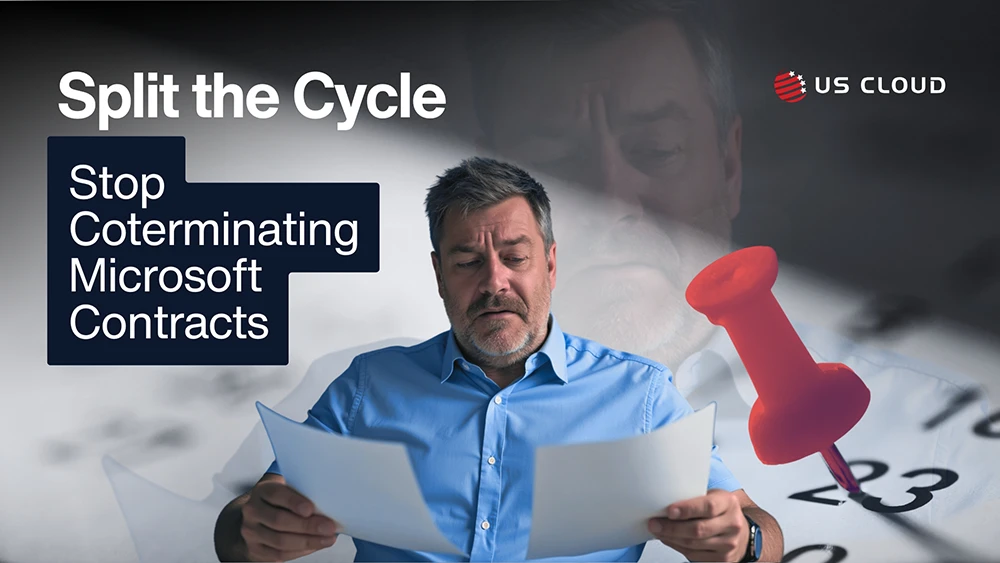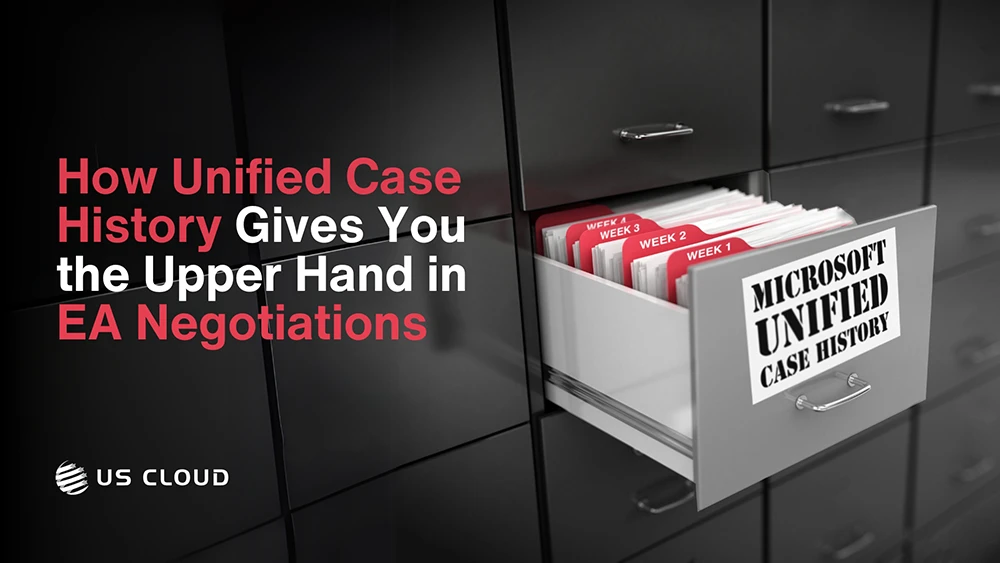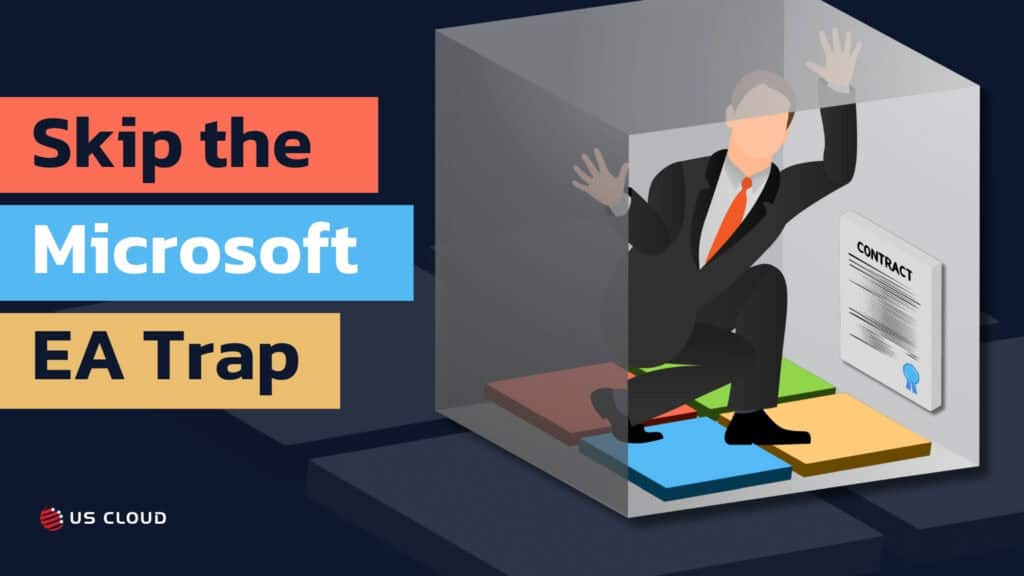
Microsoft LSP Changes 2024: Why 65% of Partners Won’t Survive.

It started with a simple announcement that sent tremors through the enterprise technology world. On January 1, 2023, Microsoft quietly dropped a bombshell: they would begin taking over their Enterprise Agreement (EA) accounts through a new Direct Sales Model, effectively ending a decades-long partnership model that had been the lifeblood of their Licensing Solution Providers (LSPs).
The numbers tell a shocking story. Within just one year, Microsoft’s Partner Ecosystem experienced a seismic shift as the tech giant reclaimed roughly one-third of large Enterprise Agreement renewals from their LSP partners.
Over the next 24 months, these partners are projected to lose an additional 65% of their EA commission revenue. By January 2026, all large Microsoft Enterprise Agreement accounts will have transitioned to Microsoft Sales Direct.
Need help navigating these changes? US Cloud offers comprehensive Microsoft licensing advisory services and cost-effective alternatives to Microsoft Unified Support. Contact us today to learn how we can help your organization adapt and thrive.
The Financial Earthquake
The Revenue Impact tells a stark tale: The global Microsoft Enterprise Agreement market is worth approximately $200 billion for 3-year term EAs. LSPs have been earning about $2.5 billion in commissions, based on a 1.25% commission rate. For Microsoft, reclaiming these commissions means a 0.39% annual EBITDA increase—a nice boost for a company worth $3 trillion.
But while Microsoft sees a modest gain, LSPs face devastation. The relative EBITDA impact on LSPs could be up to 10 times more severe than Microsoft’s gain, especially for those who haven’t diversified their business models.

Projected market shift from LSPs to MDSs Model:
| Year | LSP Commission Revenue | Microsoft’s Direct Sales Revenue | Microsoft’s Total Annual Revenue |
|---|---|---|---|
| 2023 | $2.5 billion | N/A | $211.9 billion |
| 2024 | $1.67 billion | $833 million | $245.1 billion |
| 2025 | $583 million | $1.92 billion | $278.7 billion (projected) |
| 2026 | $0 | $2.5 billion | N/A |
The Microsoft Licensing Changes Run Deep
This story goes deeper than just financial restructuring. The traditional Enterprise Software Advisor (ESA) role is being fundamentally transformed as Microsoft shifts toward Cloud Solution Provider (CSP) models. Even before the EA takeover, Microsoft had been systematically reshaping its relationship with LSPs.
They reduced “kickback fee” amounts for standard Microsoft technology while paradoxically demanding more from their partners. LSPs were expected to pick up the slack as Microsoft reduced its own staff and moved Account Managers into channel roles.
The irony? As compensation decreased, responsibilities increased. It’s like asking someone to do more work while cutting their salary—a situation that rarely ends well.
Signs of Trouble
Quality concerns had been brewing for years. Some clients reported being misinformed by their LSPs about crucial agreement terms, highlighting a growing need for transparency in LSP margins and services. This erosion of trust may have contributed to Microsoft’s push toward the Microsoft Customer Agreement (MCA) model.
The Future Isn't What It Used to Be

Industry experts see this as part of a larger transformation within the Microsoft Partner Network. Traditional licensing models like Enterprise Agreement and SPLA might be approaching their end.
New models such as CSP and MCA are poised to take their place. Microsoft appears increasingly resistant to long-term agreements, except for specific high-value suites like Microsoft 365 E5.
For enterprise customers, this shift brings both opportunities and challenges. While direct relationships with Microsoft might lead to faster response times and streamlined processes, they’ll lose the advisory role that LSPs traditionally played.
It’s like losing your trusted financial advisor and being told to work directly with Wall Street—sure, you’re cutting out the middleman, but you’re also losing valuable guidance.
When Giants Pivot: The LSP Evolution Story
Remember Blockbuster? In 2000, they had the chance to buy Netflix for $50 million. We all know how that ended. Today’s LSPs face a similar watershed moment—adapt or face extinction. But unlike Blockbuster, many LSPs are choosing a different path.
Take the story of one LSP (let’s call them TechPartner) who saw the writing on the wall back in 2023. While their competitors were clinging to traditional licensing revenue streams, TechPartner made a bold move: they completely restructured their business model.
Within six months, they had transformed from a pure licensing player into a comprehensive technology advisory firm, with Microsoft licensing representing just 40% of their revenue.
How did they do it? Think of it like a chess grandmaster who realizes they’re in a losing position but finds an unexpected way to turn the game around.
TechPartner followed what we now call the “Phoenix Strategy” (we totally made this term up but we think it’s badass)—rising from the ashes of the old LSP model with five crucial moves:
- Instead of just selling Microsoft licenses, they became technology portfolio managers, helping clients optimize spending across multiple vendors
- They transformed their sales team into solution architects, investing heavily in training and certification
- They introduced transparent pricing models, publishing their margins openly—a move that initially scared their board but ultimately built unprecedented client trust
- They zeroed in on the healthcare sector, becoming the go-to experts for medical technology compliance
- Most critically, they formed strategic partnerships with companies like US Cloud, offering clients alternatives to Microsoft’s Unified Support that cut costs by up to 50%
The results? While their competitors saw revenue plummet by 65%, TechPartner’s revenue actually grew by 15% in 2023. It’s a powerful reminder that every market disruption creates new opportunities—if you’re brave enough to seize them.
The Ripple Effect No One Expected

But here’s where the story takes an unexpected turn. Remember how Amazon started as just an online bookstore? Similarly, what’s happening with LSPs isn’t just about Microsoft’s partner program—it’s reshaping how the entire enterprise software industry works. We’re witnessing the end of the middleman era and the birth of something entirely new.
Major software vendors are watching Microsoft’s move closely. Industry insiders predict that Oracle, SAP, and others might follow suit within the next 24 months, creating a domino effect that will fundamentally change how enterprise software is sold and supported.
A New Chapter Begins
When historians write about the enterprise software industry in 2026, they’ll likely point to Microsoft’s LSP decision as a pivotal moment. But they’ll also write about the LSPs who didn’t just survive—they thrived by reinventing themselves entirely.
The successful LSPs of tomorrow won’t look anything like today’s license resellers. They’ll be hybrid organizations combining deep technical expertise, multi-vendor knowledge, and strategic advisory services. Think less “license broker” and more “digital transformation partner.”
It’s like the story of IBM’s transformation from a hardware company to a services giant—painful and challenging, but ultimately necessary and successful. The LSPs who survive this transition will emerge stronger, more versatile, and more valuable to their clients than ever before.
In this new landscape, diversification isn’t just a buzzword—it’s the difference between thriving and disappearing. Just as the smartest investors never put all their eggs in one basket, the smartest LSPs are already building diverse portfolios of services and partnerships that will carry them into the future.

Unlock Negotiation Power: Split Microsoft Enterprise Agreement Renewal

How to View Microsoft Unified Case History as a Critical EA Negotiation Tool

